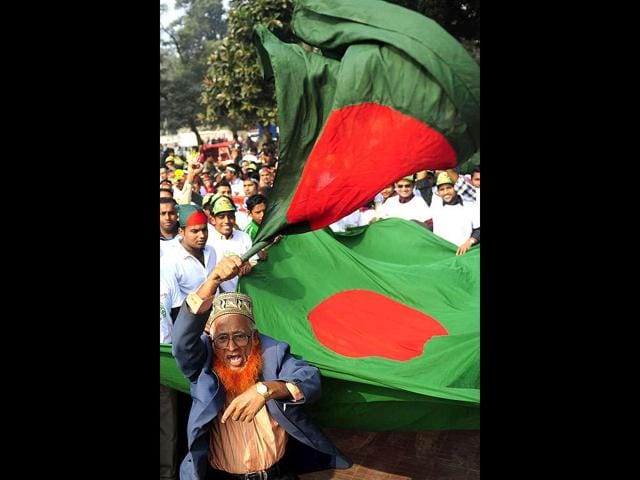Dhaka lays out position ahead of talks with India
Dhaka has also signalled that it is at ease with the Narendra Modi government, while urging sections not to 'whip up emotive frenzy' over the immigration issue.
Despite the absence of movement from the Indian side on key bilateral issues, Bangladesh has said it is 'patient, understands India's constraints, and is hopeful of positive results'. Dhaka has also signalled that it is at ease with the Narendra Modi government, while urging sections not to 'whip up emotive frenzy' over the immigration issue. The two countries have a Joint Consultative Commission meeting on September 20.

In an exclusive interview to HT, Bangladesh's high commissioner to India, Tariq A Karim admitted that prior to the Indian elections in May there was 'some uncertainty about the attitude of the new government'. But these were 'put to rest immediately' with meetings between PM Modi and Bangladesh's speaker after his swearing-in, and during external affairs minister Sushma Swaraj's visit to Dhaka. The central message is that "India attaches high importance to development of good, friendly relations and cooperation with Bangladesh… and that growth, development and stability in Bangladesh is important for India's own interests."
Comparing Modi to the Chinese leader Deng Xiaoping, Karim said, "Deng was clear that stability at home and peace in the neighbourhood were essential for his modernization program. China was at near war with many of its neighbours. But within a decade, through quiet diplomacy, China achieved a detente with India, USSR, Vietnam, Laos and Cambodia." Karim emphasised that Modi had visited China four times when he was CM of Gujarat and was 'super impressed'. "Peace with neighbours is crucial not to be distracted by unproductive activities and PM Modi understands that."
Dhaka appeared sensitive of Indian constraints on two pending issues - ratification of the Land Boundary Agreement by India, and the Teesta water pact. "There are great expectations. But we are patient. This is a new government, it is early days. Modi has a majority, but he has also said he would like to take the states along." Karim said the strength of Indian foreign policy lay in 'consensus'.
When asked if Dhaka was directly in touch with Mamata Banerjee, who has objected to the Teesta Pact, Karim said, "Foreign policy negotiations happen with the centre. We want good relations with all states, but it is for the centre to mediate these relationships." Was it frustrating that domestic politics affected bilateral ties? Karim responded by pointing to geography and geopolitics. "The distinction between domestic, bilateral and regional often gets blurred."
On 'illegal immigration', Karim said, "India's largest border is not with China or Pakistan, but with Bangladesh. Unlike those borders which have natural barriers, ours are more connected. There are peculiar creatures like enclaves - of Bangladeshi territory within India and vice versa." The two sides signed a border management plan but when 'lines are fuzzy', it is difficult to manage borders. "Let us not whip up politics with emotive frenzy but discuss the issue rationally."
On substantive bilateral issues, energy cooperation between the two countries has evolved with political willingness in Bangladesh to import power. "Even if you have a dream car, you need to start the ignition. This electric circuit is politics. Once the political circuitry is working, you need fuel, otherwise the car won't move." This fuel is energy, said Karim. "Northeast India alone has the power to generate 70,000 to 100,000 MW. We have said you generate, take most of it through Bangladesh but drop 20,000 MW, and we will invest and purchase it". In Karim's vision, this could be the start of putting in place a sub-regional power grid that could ultimately be expanded to a regional grid. Last year, a power transmission line between the two countries was inaugurated with the first grid connection being set up between Bahrampur in West Bengala and Bheramara in Bangladesh.
Pointing to other substantive achievements, Karim said LBA had resolved a border row. "On trade, India has virtually done a one way free trade agreement and opened its markets even though some practical constraints remain." Restoring severed connectivity was yet another achievement. "We are close to finalizing a coastal shipping agreement. Railway lines have been upgraded, more trade points have opened, and border haats have been revived." There is sub-regional cooperation on river basin management. The challenge, Karim said, was in now operationalising these arrangements.
Get Current Updates on India News, Lok Sabha election 2024 live, Election 2024 along with Latest News and Top Headlines from India and around the world.




